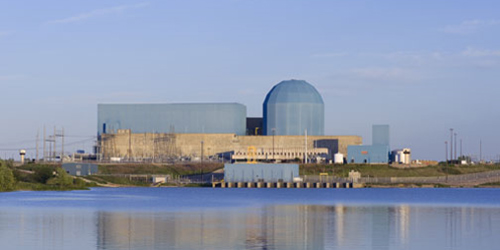By Rory D. Sweeney
Illinois lawmakers on Tuesday introduced a wide-ranging energy bill that would provide ratepayer-financed support for nuclear, coal, renewables and energy efficiency (SB 2814).
Dubbed the Future Energy Jobs Bill, it has one sponsor in each house of the General Assembly: Sen. Don Harmon and Rep. Robert Rita, both Democrats from the Chicago area. The legislation touches on almost every aspect of the electric industry:
- Zero Emission Credits (ZECs) that utilities must buy from qualifying generating units.
- A fixed resource adequacy plan (FRAP) that would put the state in charge of procuring capacity for its MISO region in Southern Illinois.
- A tariff to recover costs for increasing the implementation of energy efficiency and demand response projects.
- Revisions to the state’s renewable portfolio standard to fix an issue that advocates say hampers renewable investment.
- Revisions to the retail rate structure, including implementing a “grid impact rate.”
- Installation of up to six microgrids, restricted to specific utilities.
A version of the bill has been pushed by Exelon since it threatened in May to shut down its Clinton and Quad Cities nuclear plants if the state didn’t provide subsidies, such as the emissions credits proposed in the new bill. (See Absent Legislation, Exelon to Close Clinton, Quad Cities Nukes.)
The bill had been opposed by Dynegy, which plans to shutter three 40-year-old coal-fired plants in central and southern Illinois, but the Houston-based power provider got on board once the FRAP was added. Dynegy says Dynegy Introduces Bill to Move All of Ill. Into PJM.)
“In the last six months alone, the flawed market design has resulted in Dynegy shutting down more than 15% of generation in Southern Illinois and additional plants could be at risk in the future,” Dynegy’s David Onufer said. “The legislation deals with gaps in the downstate market by providing a competitive process to secure generation for the future. It’s non-discriminatory and open to all fuel resource types that meet the required high standards of performance.”
When neither Exelon nor Dynegy could push their initiatives through the legislature earlier this year, they decided to coalesce around one piece of legislation. (See Ill. Lawmakers Fail to Address Exelon, Dynegy Legislation.)
“The legislation reflects the work of a broad group of stakeholders to achieve comprehensive energy legislation that is urgently needed to strengthen our economy and save and create tens of thousands of jobs,” Exelon’s Paul Adams said. “As with any piece of major legislation, it will continue to evolve as stakeholders weigh in. But at its core, we know the bill will bring significant benefits to consumers and the environment in Illinois. … There is broad agreement regarding the need to urgently address energy challenges in Illinois.”
The ZECs would start at $16.50/MWh, which is based on the U.S. Interagency Working Group on Social Cost of Carbon, and increase by $1/MWh per year, starting in 2023.
The number of credits that eligible facilities would receive is less easy to calculate. The amount is based on a complicated formula that limits the increase in retail customers’ bills to no more than 2.015% of the price per kilowatt-hour that consumers paid in 2009.
The bill is opposed by the BEST Coalition, which includes a wide variety of commercial and industrial ratepayers. Organizer Dave Lundy says that because Illinois is a substantial exporter of energy, saddling in-state customers with additional costs would subsidize out-of-state consumers. He pointed to grid operator studies showing that none of the plants threatened to be closed would impact reliability to the extent that transmission would need to be built or that they would need to receive reliability must run contracts.
He called the emissions credits and FRAP “bailouts” for nuclear and coal interests and said they would cause volatility in retail rates.
Consumers, particularly those on a budget, “can’t absorb wild swings from month to month,” he said. “You may be a winner three or four months out of the year, but if you’re a loser and you’re not in a position to pay that bill, you’re in trouble.”
Lundy said the microgrids could be useful in theory, but he criticized the fact that they were granted to utilities to build and not open to competitive bidding. He feared the utilities will “gold-plate” and overcharge for them.
He also applauded the long-awaited fix to the RPS policy, but he said packaging it with the rest of the bill’s initiatives made it come at too high a cost. “I can’t even call that a positive because [the RPS fix] requires the destruction of the entire market, and you’ll never be able to build anything else,” he said. “It’s a hollow victory.”
Despite the bill’s name, “it is undeniable that a massive rate hike will make Illinois less competitive. … You will kill jobs,” he said.
“Nobody’s advocating [closing] all the baseload units in the state. … You don’t need to shut down the coal plants if they’re economic to run,” he said. “We are not anti-nuclear; we are anti-bailout.”




